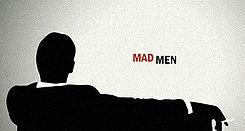 This is my favorite episode of Mad Men.
This is my favorite episode of Mad Men.
I’m not sure when it hit me that “The Flood†was what I had been waiting for ever since the beginning, but it came somewhere in between Paul Newman’s “cameo†endorsing Eugene McCarthy and Don and Bobby watching Charlton Heston cursing us for blowing it up in Planet of the Apes. I realized that this episode was doing more than marking the day of Martin Luther King, Jr.’s assassination—it was actually being it.
Somewhere in there, Matthew Weiner and company tapped into something greater than the peccadilloes of the wealthy and the bored, somehow found the confluence of the psychological and the historical, that sweet spot where the zeitgeist of an era flows purely and cleanly through what people thought they were, where the bell tolled for thee in a way that it has very few times in American history—where people were history and history were people, for real, no B.S., what was happening to everyone was happening to everyone, and here was this chance for us to look back and see what it might have felt to really be there, stripped of sentimentality, artifice, and presumption—but just to be sitting there like Don in his apartment, drink in hand, watching D.C. burn on T.V. and wondering if the world is going to survive.
Just as that advertising awards show at the beginning was pre-empted by history, so were the lives of these characters. They had no choice but to accept their own positions in a world governed by forces greater than themselves.
Yes, I’m looking at you, Don Draper. You just couldn’t escape, could you? Your mistress was out of town, so you couldn’t use sex. The alcohol didn’t work, either. So you tried a movie…but those tenacious, pernicious feelings still followed you, and they seeped up to the surface and before you knew it they were coming out of your mouth in the most remarkable monologue of your existence.
And you showed that, feckless as you may be, you’re a better man than you may appear, right when I thought, and, yes, even wrote right here that you were beyond redemption.
We saw hints of that redemptive power all over this week. The real versions of most everyone came out this week, and I wondered if what we were seeing was real.
Pete Campbell—nobly mourning Martin Luther King or simply trying to play out the fantasy of transcendent action that his wife will not allow him? Joan—hugging Dawn awkwardly, wanting to share the nurturing nature she’s worked so hard to bury for so long, or simply doing what she feels she’s supposed to by rote?
It does not seem like coincidence that these are the very characters we’ve seen having to pay for their past sins this season. Is this a detour, or a true change in direction?
Tack on the delightfully bizarre guest spot from William Mapother (Ethan from Lost), who proves he may just become the next Christopher Walken—that delightful creep that smacks every project he takes part in on the side of the head. His turn was important to this episode—it was the closest anyone got to doing the work they’re used to doing, to escaping into normalcy, and he ended up leaving them even more discombobulated than before, with even less faith in the inherent order of their existence.
Always been a Michael Ginsberg fan. Great to see him getting some development as well. His character has a lot of possibilities, though I hope he doesn’t go too far into the Woody Allen territory where he spent most of this week.
“The Flood,†as Michael Ginsberg’s father said, was a time when the animals joined together in twos. He told Michael times of crisis are when people need to be together more than ever, when people need the chance to share themselves in a manner more raw and primal than is normal. And that’s what happened on this dark day in 1968, a day I feel like I understand better now.

Leave a Reply